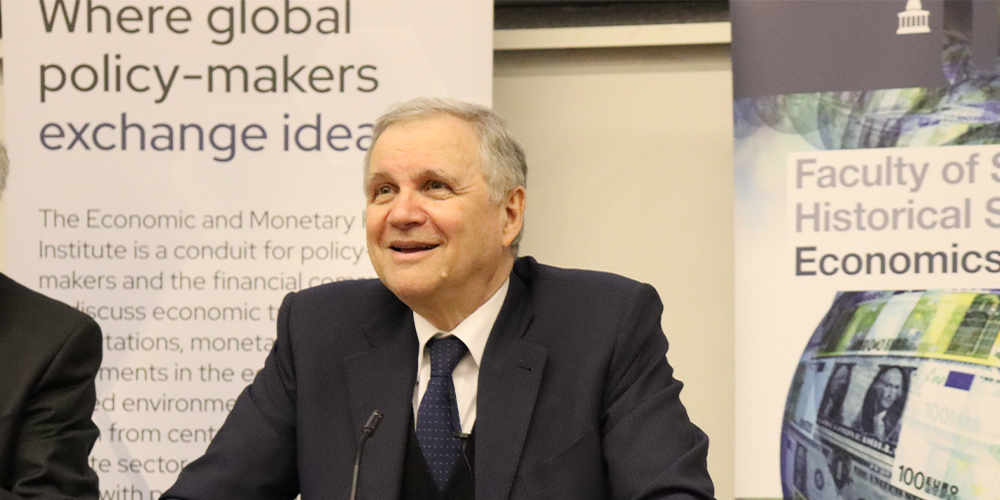The strongest call yet for a ‘wait and see’ approach on European credit tightening has been issued by Ignazio Visco, governor of the Banca d’Italia. In a lecture co-organised by OMFIF and University College London, Visco said, ‘The risk of doing too much [in credit tightening] is at least as much as doing too little.’
Without mentioning names of colleagues on the 26-member European Central Bank governing council, Visco took issue with policies favoured by ‘tighteners’ on the council such as Joachim Nagel and Klaas Knot, presidents of the German and Dutch central banks, who are particularly worried about high wage demands in their respective countries.
‘Some say you should err on the side of doing too much because that means you don’t have to overdo tightening later,’ he said. ‘But if you do too much that creates risks in the financial stability area.’ It can also have ‘non-linear’ effects which could cause debtors to ‘suffer’. ‘That’s why it is wise for us to make decisions meeting by meeting’.
Visco sees the sharp slowdown in euro area credit growth, partly resulting from 350 basis points interest rate tightening since July, as a more potent factor than the relative firmness of core inflation.
He pointed out how US inflation had spurted earlier because of President Joe Biden’s exaggeratedly stimulatory fiscal package to counter the Covid-19 outbreak. European inflation had risen later under the impact of higher gas prices after the Russian invasion of Ukraine 14 months ago. In the US, headline core inflation – stripping out energy and food – is gradually descending from a 6% peak, while in the euro area it has risen steadily to 6% from 2% at end-2021.
Despite disparities in wage bargaining behaviour across the euro area, inflation expectations in Europe seem relatively well anchored. He pointed to the sharp impact of higher interest rates on credit growth, with annualised euro area changes switching from 13% growth in August 2022 to a decline of 1% on latest figures. This reflected ‘long and variables lags’ in monetary policy working through to real conditions. Visco said he was ‘cautious not complacent’ about inflation.
The decision to restart large-scale quantitative easing in March 2020 with very large ECB government bond purchases under the pandemic emergency purchase programme was taken to lower interest rates ‘across the spectrum’ and create ‘conditions for governments which were favourable’.
Visco outlined how plans for gradual normalisation of the European monetary stance after years of ultra-accommodative policies had been blown off course by the Russian invasion.
He admitted that central banks had been ‘trapped’ with short-term interest rates close to the lower bound or, in Europe’s case, negative. He admitted that central banks had made ‘mistakes’ in believing that the rise in energy prices at the end of the pandemic but before the war started had been temporary. ‘The Ukraine war transformed a temporary problem into a prolonged one.’
But he denied that the ECB had started tightening too late when it decided after months of discussion to raise the deposit rate from minus 0.5% to zero in July 2022.
Commenting on the financial market upheavals after unfunded tax cuts by then UK Chancellor of the Exchequer Kwasi Kwarteng on 23 September, Visco said, ‘We have learnt from that.’ This was an allusion to the hitherto orthodox economic policies followed by Giorgia Meloni, the new Italian prime minister, who took over in November and is thought to have been heavily influenced by the negative response to the UK fiscal measures, which led to the ousting of both Kwarteng and Prime Minister Liz Truss.
Asked about the relative slowness of quantitative tightening in Europe, Visco said the ECB would maintain its ‘measured’ approach to phasing out reinvestment of government bonds held both under its longer-term asset purchase programme and under the newer PEPP which started three years ago. Net investment under both programmes was phased out last year.
Visco steps down from his post in the autumn after 12 years. Front runner as his replacement is Fabio Panetta, a Banca d’Italia veteran and Italian board member at the ECB.
